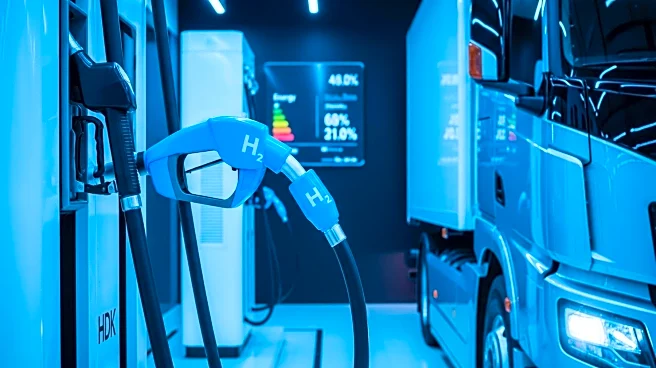What is the story about?
What's Happening?
Hyundai Motor Co., in collaboration with U.S.-based autonomous driving firm PlusAI, has developed an autonomous hydrogen-powered truck that has been recognized by Time magazine as one of the best inventions of 2025. The truck, based on Hyundai's Xcient Fuel Cell platform, is the world's first mass-produced hydrogen-powered heavy-duty truck. It features PlusAI's SuperDrive virtual driver, enabling Level 4 autonomous driving and zero tailpipe emissions. This innovation is designed to provide a sustainable and efficient solution for long-haul freight transportation. Park Chul-youn, senior vice president and head of Hyundai Motor's global commercial vehicle division, emphasized the importance of innovation and collaboration in achieving this milestone.
Why It's Important?
The recognition of Hyundai's autonomous hydrogen truck by Time magazine underscores the growing importance of sustainable transportation solutions in the automotive industry. As the world seeks to reduce carbon emissions and transition to cleaner energy sources, hydrogen-powered vehicles offer a promising alternative to traditional fossil fuels. The integration of autonomous driving technology further enhances the efficiency and safety of freight transportation, potentially reducing operational costs and human error. This development positions Hyundai and PlusAI as leaders in the push towards greener and smarter transportation solutions, which could influence industry standards and encourage other manufacturers to invest in similar technologies.
What's Next?
Hyundai and PlusAI are likely to continue their collaboration to refine and expand the capabilities of their autonomous hydrogen truck. As the technology gains recognition, it may attract interest from logistics companies seeking sustainable transportation options. Regulatory bodies may also begin to establish guidelines for the deployment of autonomous vehicles, which could impact the pace of adoption. Additionally, the success of this innovation could spur further research and development in hydrogen fuel cell technology, potentially leading to broader applications beyond heavy-duty trucks.
Beyond the Headlines
The development of autonomous hydrogen-powered trucks raises important ethical and legal considerations, particularly regarding the safety and regulation of autonomous vehicles on public roads. As these technologies become more prevalent, there will be a need for comprehensive policies to address liability in the event of accidents and to ensure the protection of public safety. Furthermore, the shift towards hydrogen fuel cells may influence global energy markets, as demand for hydrogen production and infrastructure increases.















